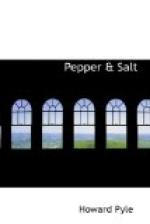the sausages, he skimmed the milk, he made the butter,
he pressed the cheese, he plucked the geese, he spun
the thread, he knit the stockings, he mended the clothes,
he patched the shoes—he was everywhere
and did all of the work of the house. When Farmer
Griggs saw these things done, and so deftly, he rubbed
his hands and chuckled to himself. He sent cook
and scullion and serving maid a-packing, there being
nothing for them to do, for, as I said, all of these
things were done as smooth as cream. But after
a time, and when the boggart’s place had become
easy to him, like an old shoe, mischief began to play
the pipes and he began to show his pranks. The
first thing that he did was to scrape the farmer’s
butter, so that it was light of weight, and all of
the people of the market town hooted at him for giving
less than he sold. Then he skimmed the children’s
milk, so that they had nothing but poor watery stuff
to pour over their pottage of a morning. He took
the milk from the cat, so that it was like to starve;
he even pilfered the bones and scrapings of the dishes
from the poor house-dog, as though he was a very magpie.
He blew out the rush-lights, so that they were all
in the dark after sunset; he made the fires burn cold,
and played a hundred and forty other impish tricks
of the like kind. As for the poor little children,
they were always crying and complaining that the boggart
did this and the boggart did that; that he scraped
the butter from their bread and pulled the coverlids
off of them at night.
Still the boggart did his work well, and so Farmer
Griggs put up with his evil ways as long as he could.
At last the time came when he could bear it no longer.
“Look’ee, now, Mally,” said he to
his dame, “it’s all along o’ thee
that this trouble’s coome intull th’ house.
I’d never let the boggart in with my own good-will!”
So spoke Farmer Griggs, for even nowadays there are
men here and there who will now and then lay their
own bundle of faults on their wives’ shoulders.
“I bade thee do naught but shut the door!”
answered Dame Griggs.
“Ay; it’s easy enough to shut the door
after the trouble’s come in!”
“Then turn it out again!”
“Turn un out! Odds bodkins, that’s
woman’s wit! Dost’ee not see that
there’s no turnin’ o’ un out?
Na, na; there’s naught to do but to go out ourselves!”
Yes; there was nothing else to be done. Go they
must, if they would be rid of the boggart. So
one fine bright day in the blessed spring-time, they
packed all of their belongings into a great wain, or
cart, and set off to find a new home.
Oft they trudged, just as you see in the picture,
the three little children seated high up in the wain,
and the farmer and the dame plodding ahead.
[Illustration: THE DEPARTURE.]
[Illustration: Farmer Griggs and the Wise Man.]
Now, as they came to the bottom of Shooter’s
Hill, whom should they meet but their good neighbor
and gossip, Jerry Jinks. “So, Georgie,”
said he, “you’re leavin’ th’
ould house at last?”




